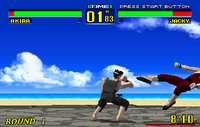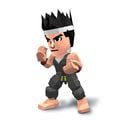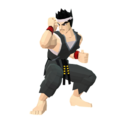Akira Yuki: Difference between revisions
m (→Origin) |
m (→Origin) |
||
| Line 30: | Line 30: | ||
Akira does not seek money or glory from fighting and entering tournaments. He instead fights simply to test himself and his abilities. Akira also seeks to learn the meaning of "true fighting," something that his grandfather assures he will learn in time. Akira is usually seen wearing a traditional sleeveless fighting Gi, either white or black, and a head band around his spiky hair. | Akira does not seek money or glory from fighting and entering tournaments. He instead fights simply to test himself and his abilities. Akira also seeks to learn the meaning of "true fighting," something that his grandfather assures he will learn in time. Akira is usually seen wearing a traditional sleeveless fighting Gi, either white or black, and a head band around his spiky hair. | ||
{{ | {{clrl}} | ||
==In ''[[Super Smash Bros. 4]]''== | ==In ''[[Super Smash Bros. 4]]''== | ||
Revision as of 00:27, May 29, 2021
- "Akira" redirects here. For the Persona 5 character known as Akira in the manga adaptation, see Joker.
| Akira Yuki | |
|---|---|
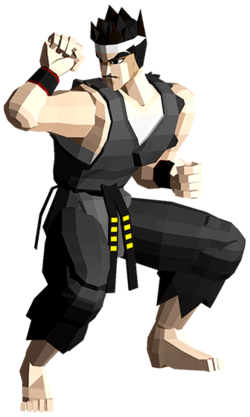  Official render of Akira from Virtua Fighter. | |
| Universe | Virtua Fighter |
| Debut | Virtua Fighter (1993) |
| Smash Bros. appearances | SSB4 Ultimate |
| Most recent non-Smash appearance | Virtua Fighter 5 (Ultimate Showdown/2021) |
| Console/platform of origin | Arcade |
| Species | Human |
| Gender | Male |
| Place of origin | Japan |
| Created by | Yu Suzuki |
| Designed by | Seiichi Ishii |
| Voice actor | Shin'ichirō Miki |
| Article on Wikipedia | Akira Yuki |
Akira Yuki (結城 晶, Akira Yuki) is the main protagonist and mascot of the Virtua Fighter universe.
Origin
Akira Yuki is the mascot of the Virtua Fighter series. He is the grandson of the man who invented a unique version of the Bājíquán martial art for japanese soldiers to use during the Second World War. In the original game, he serves as the assistant instructor at his family's dojo, Yuki Budokan. When he learns of the first World Fighting Tournament at age 23, he decides to enter not for glory, but to further hone his Bājíquán techniques and to understand what "true fighting" is about. The plot of Virtua Fighter 2 elaborates that his overly enthusiastic attitude was met with disapproval by the fellow tournament entrants. He was defeated and humiliated by Kage, which Akira now holds a grudge against. After putting himself through rigorous training, he attended the second World Fighting Tournament and won. As he showed his grandfather his trophy, he simply said "Don't flatter yourself. You haven't mastered anything yet." Believing he had not found his true strength yet, he attended the third World Fighting tournament and lost. After some encouragement from his grandfather, Akira secluded himself in the mountains to train more, still trying to figure out what "real power" really is. While training, he received an invitation for the fourth World Fighting Tournament. He entered and lost to Kage-Maru. Returning to the mountains, he trained even harder. Akira then attended the fifth World Fighting Tournament, with his results currently unknown.
Akira is the typical traditional martial artist common in fighting games. His preferred style of Bājíquán relies heavily on using parts of the upper body, like elbows, hips and shoulders, to forcefully push an opponent. Most of the damage comes from quick acceleration of the body from a short distance. Akira is the only playable character that uses this technique, with the only other canonical user being his grandfather.
Akira does not seek money or glory from fighting and entering tournaments. He instead fights simply to test himself and his abilities. Akira also seeks to learn the meaning of "true fighting," something that his grandfather assures he will learn in time. Akira is usually seen wearing a traditional sleeveless fighting Gi, either white or black, and a head band around his spiky hair.
In Super Smash Bros. 4
As a costume
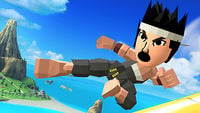
Akira is the basis for a paid downloadable content costume for Mii Brawlers. Nintendo also released a QR code for those who wish to have the exact Mii used in the costume's advertising. The costume is similar to his debut appearance in the original Virtua Fighter, where graphical limitations had him appear in a blocky and polygonal form.
In Super Smash Bros. Ultimate
As an Assist Trophy
| “ | From the original Virtua Fighter game, Akira joins the battle with the same graphic style as his original appearance. He has a wide variety of attacks at his disposal, but none represent him better than his Tetsuzankou. When he leaves the fight he says his signature line!
*By the way, Bayonetta's forward throw is also based off of Tetsuzankou. |
” |
| —Super Smash Blog, Super Smash Bros. Ultimate Official Site | ||
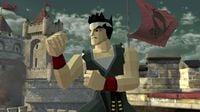
Akira appears as an Assist Trophy. He appears with his blocky model from the original Virtua Fighter, and his animations resemble the choppy movements of the original game. However, his voice clips are sourced from Virtua Fighter 4. As a result, his appearance is similar to Virtua Fighter 10th Anniversary, a port of the original game built on Virtua Fighter 4's engine.
He can use a variety of martial arts attacks from Virtua Fighter, including his signature move, the Tetsuzanko (where he grabs an opponent and slams into them, launching them forward). He can also block incoming attacks. He can be defeated as well. Before he disappears, he says his famous quote from the Virtua Fighter series, "十年早いんだよ!" ("It's ten years too soon for you to challenge me!", literally "Ten years too early!") He is also a Spirit in the game's Spirits mode.
As a costume
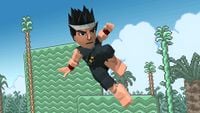
Akira appears as a downloadable content Mii Costume for Mii Brawlers, released with the fourth wave of Mii Fighters.
Spirit
| No. | Image | Name | Type | Class | Slots | Base |
Max |
Base |
Max |
Base |
Max |
Ability | Series |
|---|---|---|---|---|---|---|---|---|---|---|---|---|---|
| 1,294 | Akira | ★★★★ | 3 | 3966 | 9918 | 2098 | 5245 | 1716 | 4292 | Fist Attack ↑ | Virtua Fighter Series |
Gallery
Akira attacking Ryu on Umbra Clock Tower.
Names in other languages
| Language | Name |
|---|---|
| 結城 晶, Akira Yuki | |
| Akira | |
| Akira | |
| Akira | |
| Akira | |
| Akira | |
| Akira | |
| Akira | |
| Akira | |
| Акира |
Trivia
- Akira appeared in various games alongside other Super Smash Bros. characters outside of the Super Smash Bros. series, most of them doing connections with Sonic:
- He appears as a capsule toy in Shenmue and Shenmue II, featuring his original model from Virtua Fighter, alongside Sonic.
- In Sonic & SEGA All-Stars Racing, Akira teams up with Jacky to race against Sonic and other characters. He and Jacky can race against a Mii on the Wii version and Banjo & Kazooie on the Xbox 360 version as well. Due to hardware limitations, Akira is excluded from the Nintendo DS version.
- Akira is a playable character in Dengeki Bunko: Fighting Climax, where one of the stages is Green Hill Zone.
- He's a playable solo unit in both Project X Zone and Project X Zone 2, where Ryu and Ken are playable units as well.
- He was one of certain characters that could be summoned in SEGA Heroes, alongside Sonic.
- Bayonetta performs the Tetsuzanko technique for her forward throw, and she will occasionally say "十年早いんだよ!" in reference to Akira's line. This is a carryover of a similar easter egg from Bayonetta, and is acknowledged in Akira's blog entry.
- Akira's opponents in the November 1 Direct include Zero Suit Samus, referencing how she looks similar to Sarah Bryant, and Wolf, referencing Wolf Hawkfield.
- This was referenced once before in his SSB4 Mii Costume reveal, where the Jacky Mii is also seen fighting Zero Suit Samus.
- In the Wave 4 Mii costume showcase for Ultimate, an Akira Mii is shown fighting Bayonetta, referencing her use of Tetsuzanko, and alongside a Jacky Mii fighting a metal Mii Brawler, referencing Dural.
- The pose used for Akira's Assist Trophy render is nearly identical to a piece of artwork from the original Virtua Fighter, which is used for his Spirit.
| Character Inspirations for Mii Fighter Costumes in Super Smash Bros. 4 | |
|---|---|
| Akira · Captain Falcon · Flying Man · Heihachi · Jacky · King K. Rool · Knuckles · Toad | |
| Ashley · Black Knight · Chrom · Dunban · Gil · Link · Lloyd · Monster Hunter · Takamaru · Viridi · Zero | |
| Fox · Geno · Inkling · Isabelle · K.K. Slider · MegaMan.EXE · Proto Man · Samus · Tails · X | |
| Headgear only | Barbara · Chain Chomp · Chocobo · Daisy · Inkling Squid · Luigi · Majora's Mask · Mario · Meta Knight · Peach · Red Shell · Sheik · Shy Guy · Spiny · Super Mushroom · Waluigi · Wario · Zelda |
